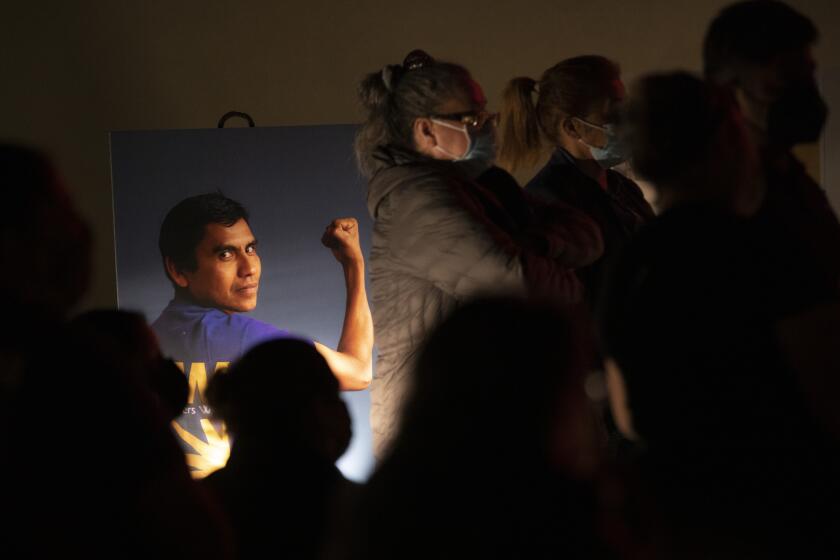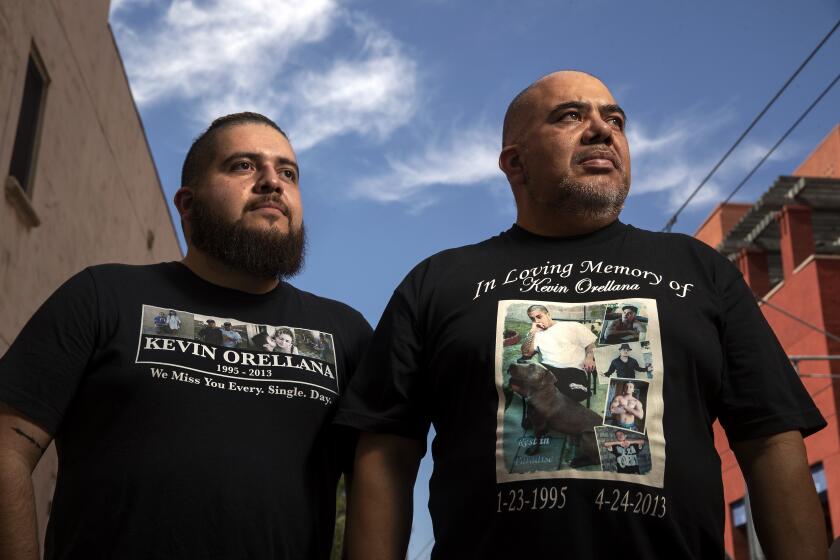A search for justice after a mentally ill 17-year-old stabs janitor to death
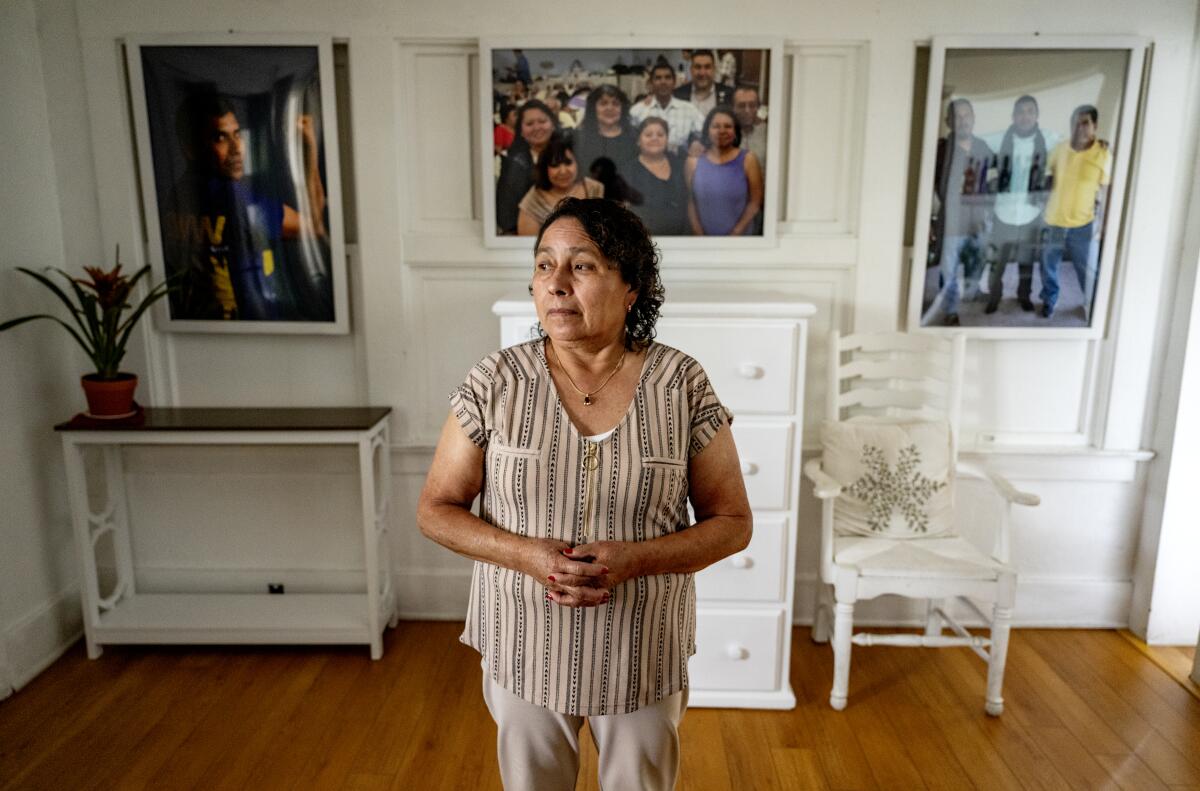
- Share via
To Dora Molina, the teenager who took her husband’s life is a danger to the public and needs to spend up to 30 years behind bars, about the same amount of time she and José Tomás Mejía were together.
She doesn’t want the assailant to enjoy his youth so soon after killing the Salvadoran immigrant, who spent his life fighting on behalf of others.
To those who knew the teen, however, the stabbing was the last step on a troubling path that started in the small room where he watched his mother die from a terminal illness; one that evolved into manic episodes and a break from reality.
Mejía’s murder and the prosecution of his teenage killer underscore the complicated search for justice when people who commit horrific crimes are young and mentally ill. The youth, who is now 18 and has been diagnosed with schizophrenia, admitted to the murder in juvenile court. He was 17 at the time of the crime; under state law, he’ll probably be released when he’s 25.
That infuriates Molina and Mejía’s loved ones, who say “race, class and privilege” skewed the outcome of “this tragedy.” Mejía is Latino, his killer white.
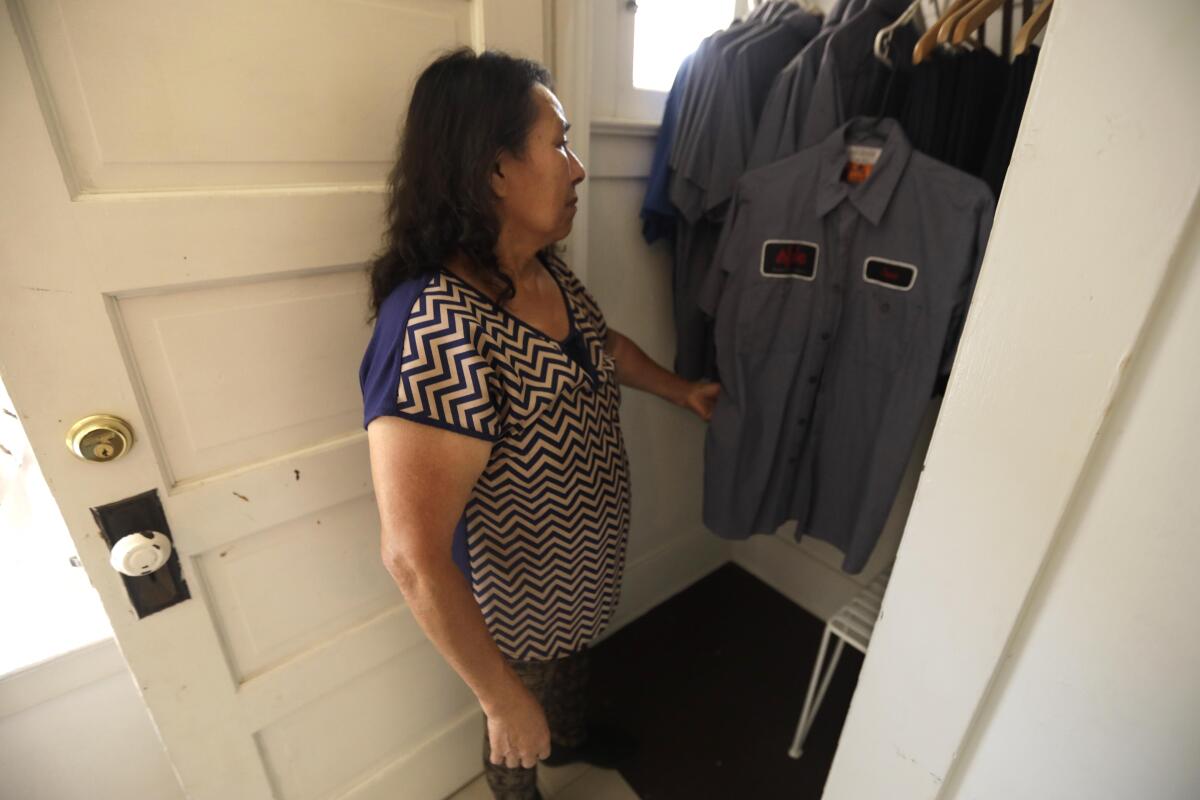
“This justice system was never meant to work for Black and brown people and people of color,” said Alejandra Valles, secretary treasurer and chief of staff of the Service Employees International Union-United Service Workers West, but more important, Mejía’s friend. “Criminal justice reform shouldn’t mean that there is no accountability and that you can brutally take someone’s life and get a slap on the wrist.”
But at a time when prosecutors, experts on juvenile justice and even the U.S. Supreme Court have moved away from extreme punishment for teenage murderers, some say the decision to spare Mejía’s killer from adult court marks progress.
“I understand people feeling like maybe this wasn’t the right outcome, but the reality is this is a kid who was suffering, untreated, from a severe mental illness that wasn’t diagnosed, that wasn’t even flagged in a real way and that is a systemic failure,” said his attorney, Jerod Gunsberg. “This is one of those cases where at three in the morning you’re up looking at the ceiling and wondering how it all got here and you realize that there’s no easy answer.”
On Monday morning, in an East Los Angeles courtroom, the issues — and the families — converged during the teenager’s disposition hearing.
“The word justice is spoken of, and the word closure is spoken of. I don’t believe there is such a thing as closure at all, especially in a case like this, because everybody is forever changed by what happened here,” said Judge Christina L. Hill. “And the issue of justice — what is justice in a case like this?”
José Tomás Mejía, a janitor, spent years fighting for fellow workers in California. He was killed in the apartment building where he worked.
The teenager was around 4 years old when his mother was diagnosed with amyotrophic lateral sclerosis, an incurable neuro-degenerative disease. She raised him as she was dying, in Los Angeles and later in Northern California.
A family friend who helped raise the teen in L.A. said his mother did not want to disclose her illness to even her closest friends. She could become intensely jealous when her son bonded with other adults.
The Times is not identifying the teen because he was under 18 at the time of the slaying. The friend, who wished to remain anonymous to protect the teen’s identity, recalled several incidents where she would hear a loud “thump” upstairs and find the boy’s mother collapsed on the ground while her son looked on.
His mother also may have struggled to care for him because of her diagnosis. At age 4, the boy was not toilet trained and still slept in the same bed as his ailing mother.
After her death, he moved in with another friend who helped care for his mother in Northern California. He was 12 and would ask people to punch him in the face.
Soon after, he went to live with his father in L.A.
In 2021, the teenager started having a hard time in school. At one point, a family friend took the teen and his girlfriend to dinner. Afterward, she said, “he was manic.”
“You know what,” the teen told her, “I found the key to life and I can do everything.”
Less than two months before the murder, the teen’s father decided he wanted to move to Arizona. The teen refused, saying he wanted to finish his senior year of high school in Los Angeles and stay with his girlfriend. Eventually, the father relented, despite being aware of the teen’s manic behavior, according to the family friend.
It did not appear that the boy’s father ever tried to get him into therapy despite being aware of his manic episodes, according to the family friend and Alisa Blair, a former high-ranking member of the district attorney’s office who oversaw juvenile cases.
Through Gunsberg, the defendant’s father declined to be interviewed.
In the weeks leading up to the murder, the teenager began to withdraw and dissociate from reality, Gunsberg said. He would wander the city and ramble on FaceTime to his friends.
On June 16, 2021, the then-17-year-old texted his girlfriend. He said he needed to kill her dad.
He headed to Park La Brea, the sprawling apartment complex where the girl lived and where the two met about a year earlier. He was armed with a kitchen knife. Auditory hallucinations and delusions told him he was there to carry out some kind of grand plan, his lawyer said.
That’s where he crossed paths with Mejía.
Mejía was the same age as his assailant when he fled the civil war in El Salvador. After arriving in Mexico, he was assaulted, robbed and left with nothing. He slept on empty cement bags at the construction site where he worked to help save enough to journey to L.A.
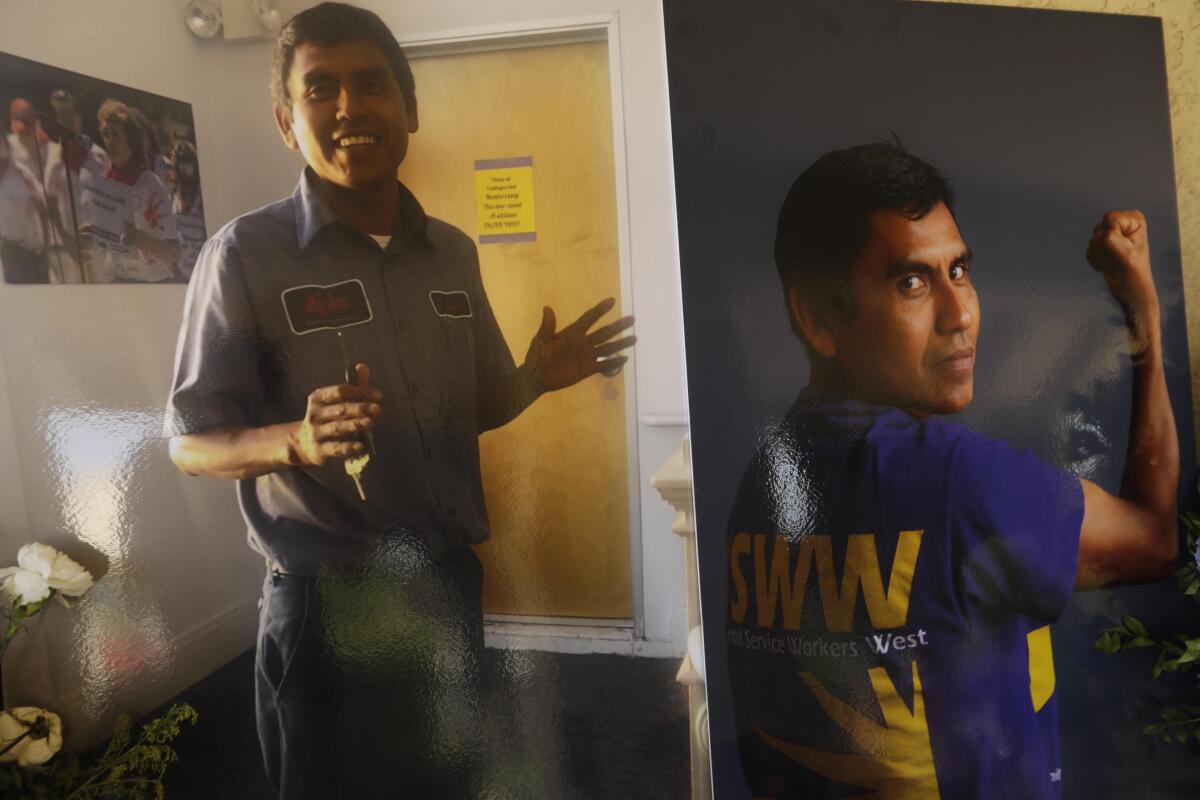
A janitor at Park La Brea, Mejía was working on the fifth floor of Tower 33 when the teenager approached him holding a knife. There was a confrontation, and he stabbed Mejía more than a dozen times. The young man took Mejía’s keys and tried to use them to get into his girlfriend’s apartment.
But the keys didn’t open individual unit doors. So he knocked.
The girl’s father opened the door and saw the teen covered in blood and holding a knife, so he shut him out, according to a police report. Soon after, the teen banged on the door. When his girlfriend opened it, he pushed his way into the apartment, the knife raised menacingly above his head, police said.
The teenager struggled with his girlfriend’s father and pushed the older man, leaving a bloody hand print on his shirt, according to their interviews with police. The father did not respond to requests for comment.
Eventually, father and daughter were able to shove the teenager out of the apartment and close the door. The young man fled, leaving behind the bloodied knife and keys. When officers arrived, they followed a trail of blood leading to the stairwell.
That’s where they found Mejía. The 50-year-old wasn’t breathing.
Police arrested the teen at a nearby hospital, where he was receiving treatment for a cut on his hand. After his arrest, he landed in juvenile hall. Once there, his lawyer said, he was evaluated by the county’s Department of Mental Health and found to be in a completely disassociated, psychotic state. He was diagnosed with schizophrenia and put on an anti-psychotic.
Gunsberg immediately declared doubts as to the teen’s competence — at the young man’s first court appearance and ever since.
The teen, “didn’t fully comprehend what he was doing there or really what had happened,” the lawyer said. “He wasn’t in reality. It wasn’t until he began medication and treatment that he came back.”
The case would become one of several to test progressive Dist. Atty. George Gascón’s stance on juvenile prosecutions. When he ran for office in 2020, Gascón promised a battery of changes to the way prosecutors did business in L.A., which included far less punitive outcomes for juvenile defendants.
At first, he outright banned prosecutors from seeking to transfer juveniles to adult court. But after receiving backlash for his handling of several cases in which juveniles were accused of heinous crimes, Gascón created a committee last year that could grant prosecutors approval to seek transfers to adult court.
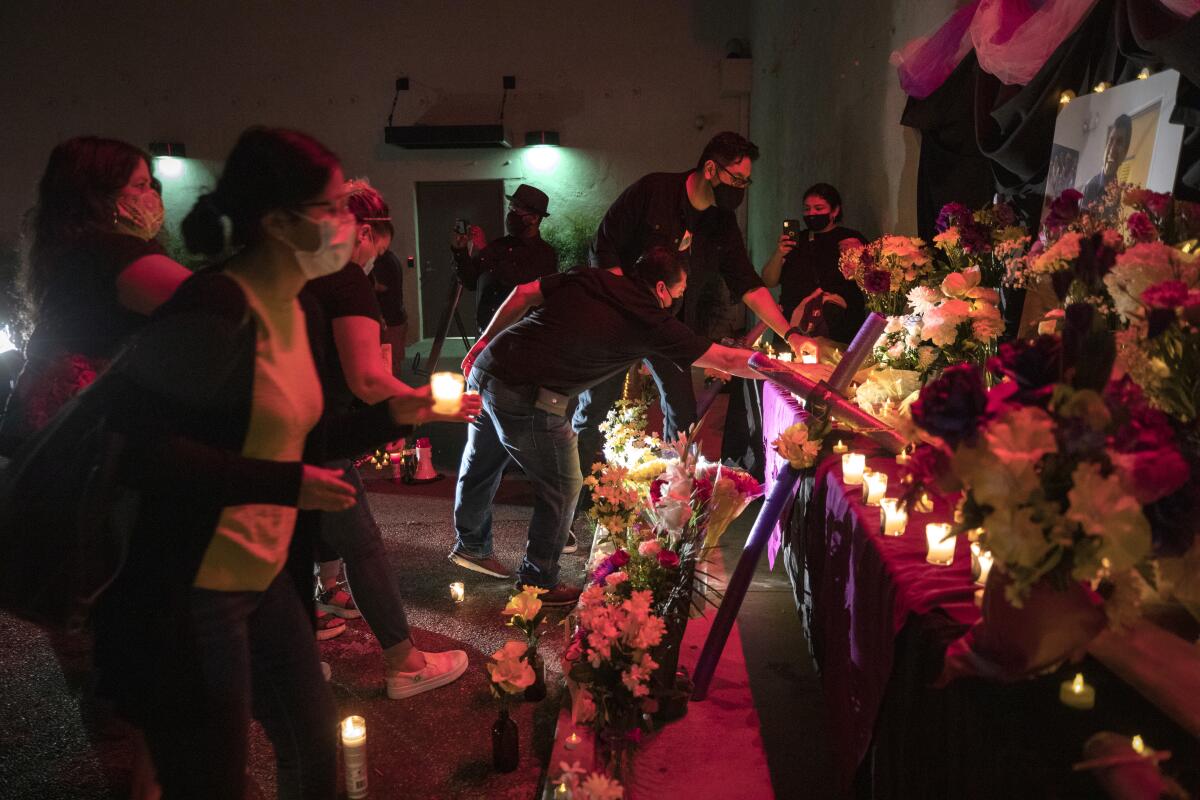
When Mejía’s murder occurred, the blanket ban was in place. But the committee reviewed the murder and decided not to seek a transfer motion. The committee has only sought to transfer three cases to adult court in the year since it was created, according to public records. One of those transfer attempts has already been slapped down by a judge.
Blair said that, while she understands the Mejía family’s pain, prosecuting his killer as an adult would only serve to ruin a second life.
“Juvenile jurisdiction is designed at least to facilitate concentrated rehabilitation efforts as opposed to the adult system where the concentration is punishment and incapacitation,” said Blair, who left the district attorney’s office last year.
Blair said it was unlikely that the case would have been sent to adult court even before Gascón took office, given the teen’s mental health issues and lack of criminal record.
Across the nation, prosecutors and legislators have been moving away from extreme punishment for juveniles, even those accused of murder. In recent years, changes in California law have made it harder to try juveniles as adults. The number of juveniles tried in adult court statewide fell from 158 in 2017 to just 25 in 2020, according to data tracked by the California attorney general’s office.
L.A. County Dist. Atty. George Gascón was elected, in part, on a promise to stop trying juveniles as adults. But as some seek to be resentenced under a 2017 California law, that stance has frustrated some crime victims.
The first time Molina saw the jovencito — youngster — who killed her husband, she said he looked dirty, his hair messy. She felt sorry for his parents, thinking of her own children and grandchildren. But when she’s seen him in court more recently, she’s questioned whether he’s mentally ill, because “he looks really well.”
Gunsberg said the teenager has gotten better since he was put on medication and started treatment.
At a recent hearing, Molina grew angry when she heard the judge praise the teenager for his good behavior. Angry thinking of, “all the possibilities he’s going to have.”
“Since we first went to court, it was only to receive bad news,” the 63-year-old said. “It’s always on the kid’s side.”
“They’ve never said, ‘Look, Señora Dora, we’re going to do everything we can, because this young man took your husband’s life,’” she said. “Never, never a word like that.”
There isn’t a place Molina goes, she said, that she isn’t reminded of her husband. Nearly two years have passed “and I feel like it happened yesterday.” At times, when someone takes Mejía’s seat at the dining room table, she imagines for a moment that it’s him.
She hadn’t been prepared to manage the house Mejía bought less than a year before his death. Molina paved over the ground where her husband had planted tomatoes, unable to tend the garden as he did.
His memory remains, captured in photos that hang throughout the house. Grinning in his janitor uniform. Flexing a bicep in his purple SEIU-USWW shirt. Posing in front of the state Capitol, where he went with fellow union members.
Molina said she has asked God to ensure the teenager receives a 25- to 30-year sentence in jail, what she considers “a fair punishment for taking the life of someone like that.” Under state law, he will be released when he is 25.
Valles, with SEIU-USWW, has joined Molina at nearly every hearing. She pointed out that the teenager is white and comes from an affluent family, factors she argues mean he’s being let off easy.
“You can’t look at this case without looking at race, class and privilege,” she said. “Had he been a brown or Black kid, or Tomás’ kid, or a janitor’s kid, is that what would be happening right now?”
“Does this feel right? No. Does this feel like justice? No.”
In court Monday, family members of Mejía and the teenager gathered for an emotional disposition hearing. The teenager, in an orange jumpsuit, watched as Molina stepped forward to share the loneliness she’s felt since her husband’s “cruel” death.
Mejía’s younger brother followed. Then his cousin. Then the SEIU-USWW president. They told the court about a man who helped his family in El Salvador out of a crisis. Who fought for a more just world for janitors. Who was a hero to his loved ones, his union and the community.
When the teenager’s father rose from his seat, he offered an apology to Mejía’s family before breaking down in tears. He said he’d sent his son to one of the best schools in the city and that “COVID hit and these kids didn’t know what to do.”
He said his son “suffered from schizophrenia,” which was not known until after Mejía’s murder. The boy’s grandfather on his mother’s side was schizophrenic, he said.
The teenager spoke briefly, staring forward as he offered an apology.
“Words will not change the pain that I’ve caused. I wish it did, but right now words are all I have,” he said. “Please know that I’m truly sorry.”
After everyone spoke, the judge affirmed that the teenager would be sent to L.A. County’s Secure Youth Treatment Facility at Barry J. Nidorf Juvenile Hall in Sylmar until he turns 25. She thanked Mejía’s family for sharing his story and called him “a dignified, decent human being that we all should strive to be like.”
She called the case “a tragedy on so many levels, but obviously the most tragic thing is that Mr. Mejía will never walk among us again,” she said.
And she directed some of her final words to the teenager before her: “I hope that you spend some time every day for the rest of your life trying to be the type of person that Mr. Mejía was.”
More to Read
Sign up for Essential California
The most important California stories and recommendations in your inbox every morning.
You may occasionally receive promotional content from the Los Angeles Times.
